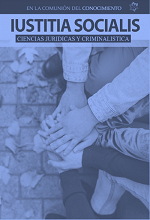The violation of the right to privacy through social networks
DOI:
https://doi.org/10.35381/racji.v5i3.1126Keywords:
Social networks, data Protection, right to privacy.Abstract
The main objective of this research is to determine the incidence of the improper handling of intimate information in social networks as a means of violation of rights. It aims to contribute significantly to constitutional matters, through a doctrinal and jurisprudential study of the right to privacy and the protection of personal data. From the quantitative, exploratory paradigm with a descriptive-analytical methodological design; whose methods that were used were the interpretive method, the grammatical method, the same ones that made possible the analysis of data around the subject of study. The bibliographic-documentary technique, allowed the inquiries made, are based on scientific articles, laws, agreements; in addition to virtual news media. According to the review carried out, it was concluded that it is evident in the Ecuadorian context that the way in which private life is exposed in social networks and virtual environments is worrying, and the consequences of these acts that threaten the integrity of people.
Downloads
References
Asamblea General de las Naciones Unidas. (16 de diciembre de 1966). Pacto Internacional de Derechos Civiles y Políticos. [International Covenant on Civil and Political Rights]. Nueva York, Estados Unidos. Obtenido de https://www.ohchr.org/Documents/ProfessionalInterest/ccpr_SP.pdf
Asamblea Nacional Constituyente de la República del Ecuador, (2008). Constitución de la República del Ecuador. [Constitution of the Republic of Ecuador]. Montecristi. Registro Oficial 449 de 20-oct-2008. Recuperado de https://n9.cl/sia
Asamblea Nacional de la República del Ecuador. (2014). Código Orgánico Integral Penal [Comprehensive Organic Criminal Code]. Recuperado de https://n9.cl/g6sc
Chen-Mok, S. (2010) Privacidad y protección de datos un análisis de legislación comparada. [Privacy and data protection an analysis of comparative information]. Diálogos, 11(1), 111-152. Recuperado de: http://www.redalyc.org/articulo.oa?id=43915696004
Congreso Nacional del Ecuador(10-agosto-1992). Ley Especial de Telecomunicaciones. [Special Telecommunications Law] Quito. Ecuador. Registro Oficial996 de 10-ago-1992.
Convención Americana sobre Derechos Humanos (Pacto de San José). (1969). [Convention on Human Rights (San Jose Pact). (1969)] Obtenido https://n9.cl/jpyc
EL COMERCIO. (11 de ENERO de 2018). El comercio/ actualidad - seguridad. [Trade/current affairs – security]. Recuperado de: https://n9.cl/e39ls
EL UNIVERSO. (12 de MARZO de 2017). El universo/ sección noticias. [The universe/news section] Recuperado de: https://n9.cl/48yv7
Organización de Estados Americanos. Convención Americana sobre Derechos Humanos. [American Convention on Human Rights]. (Pacto de San José) (Gaceta Oficial No. 9460 del 11 de febrero de1978). Recuperado de: https://n9.cl/780p
Organización de Naciones Unidas. (10 de diciembre de 1948). Declaración. Declaración Universal de los Derechos Humanos. [Statement. Universal Declaration of Human Rights], Whashintong, Estados Unidos: ONU.
Published
How to Cite
Issue
Section
License
CC BY-NC-SA : Esta licencia permite a los reutilizadores distribuir, remezclar, adaptar y construir sobre el material en cualquier medio o formato solo con fines no comerciales, y solo siempre y cuando se dé la atribución al creador. Si remezcla, adapta o construye sobre el material, debe licenciar el material modificado bajo términos idénticos.
OAI-PMH URL: https://fundacionkoinonia.com.ve/ojs/index.php/Iustitia_Socialis/oai










